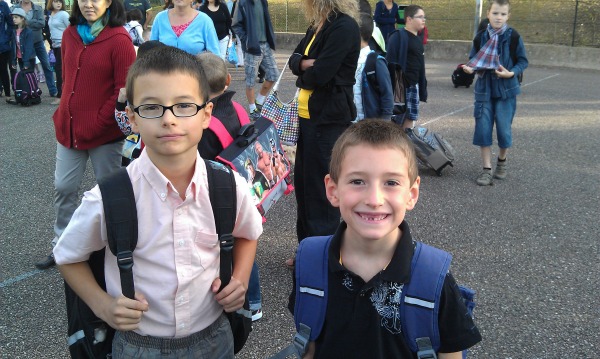My husband (a native French speaker) and I (an advanced non-native French speaker) have raised our two boys bilingually since they were born. They are 7 and 10 and in the 2nd and 5th grades. We normally live in the US and spend five to six weeks in France every two years. But, we wanted more! We are currently at the mid-point of a five-month stay in France.
Although we have been pleased with their bilingual progress while living in the US, it was important to us that they spend an extended period of time in France to truly experience daily life in their second country, as well as to focus on literacy. Although both of our boys can read at an age-appropriate level in French, we have found that one of the most difficult challenges of our bilingual lifestyle is making sure that our children can write in their second language. Life is already so busy with school and other activities in the US that it is hard to fit in study of French grammar or other subjects in French.
Though we have been thinking about it for a while, we organized this entire extended stay in France fairly quickly, in about two months, including finding lodging and signing them up for school — though I would not necessarily recommend doing it that way! Our boys’ bilingual progress was truly our sole motivation for the trip and when we saw a window of opportunity, we jumped on it. A side benefit is, of course, that we all get to spend time abroad together. I also benefit from speaking French in a real-world setting. For various logistical reasons, we decided to spend one semester abroad instead of an entire year.
The French school year starts later than it does Colorado, where we normally live, so the boys had a few extra weeks of vacation. The flip side of that is that they were bored by then and needed the stimulation of a school environment. They will also spend less time in school this year than any of their French or American classmates and we need to work on the side to catch any concepts falling through the cracks, especially math. In France, their public school is walking distance and there are only 100 students, both of which we appreciate. Since the boys’ spoken French was already strong when we arrived, their overall integration was smooth and they made friends quickly. There is no school in France on Wednesdays for elementary school children, and the boys spend all day mid-week with their grandparents, which all four of them enjoy very much.
For our younger son, grammar is not yet heavily covered at his age and he is doing very well and keeping up in all subjects. Our older son’s peers have already studied various grammatical concepts in depth in earlier grades, however, so he does get frustrated at times with tasks like verb conjugation. (Un)fortunately for him, his mother (me) is a French grammar nerd so we can and do have marathon study sessions at home. He is a talker though and loves to give presentations at school, even in French. Also, while he loves being half-French, the adjustment has been harder for him. When he is frustrated, he tells us (or his teachers!) that it doesn’t matter — he will soon be returning to the US! That has shown us that coming for half a year was not ideal.
My husband and I are continuing to work for our US-based company/clients remotely, which is a blessing and a curse. We couldn’t have taken this trip without that possibility, but it is draining to constantly straddle two time zones and to speak English with our US contacts while in France.
Overall, though, the positives far outweigh the negatives and we are very pleased with our trip so far. The cultural and linguistic progress the boys have made is totally worth any inconvenience as is the time we have spent here together as a family and with extended family. I am already planning our next extended stay!




Salut Eve! what a wonderful experience, you just inspired me to look into summer schools abroad!
I am so glad! I was inspired by several other translators I know who had done similar trips with their families. It helps to see others do it successfully. Good luck!
1. You look adorable in that hat.
2. I think it’s great that you are taking your kids to get formal schooling in France. I know several people who raised their kids in French households in the U.S. who got horrible shocks when they realized how poorly their kids spelling and grammar skills had been neglected.
3. I am glad you are having fun, but am looking forward to you being back in the U.S.
Jenn – you make me laugh – what nice comments! I have been trying to get that picture updated, but WordPress is hiding it somewhere! Talk to you soon! Eve
What an amazing experience for everyone in your family, Eve! Thanks for being honest about what’s been good and what’s been complicated… I think it’s a huge plus to have extended family in the place you choose to go for an immersion experience. The bonds created there are sure to be much stronger than when visiting only for a few weeks!
I can’t wait until I can do something similar with my kids back in Peru!
Yes, Roxana, you are right. I don’t think that we (personally) could have done it without help from my in-laws – or, at least, it would have been a lot more difficult and stressful. They located housing for us, and also added additional items that were missing from the furnished apartment we are renting (such as beds for the boys and some additional pots and pans). It was difficult to find a *furnished* apartment where are (a small town in northeastern France) so they put in a lot of leg work for us. In addition, “unfurnished” in France really means with nothing – no fridge, no oven, and sometimes no kitchen sink! So, we really did need “furnished.” Thank you, SpanglishBaby, for allowing me to guest post and share this with others who are enthusiastic about bilingualism!
I think this is wonderful. I hope you all have a great time and it really helps your boys. I see you are a translator, that is pretty flexible. I have a flexible self employed position as well. But what about your husband? What does he do that allows for 5 months of travel? I imagine this would be out of reach for many families, just because of the logistics. Mine included! I could never do this unless I went by myself with the kids. How did that work out for you all?
That is a good question. My husband works for a “traditional” company – he is not self employed. We were very lucky that they knew him long and well enough to approve him working remotely for 5 months. He did have to fly back twice for two weeks each to check in, in person, but otherwise, he has been working from France during our stay for his US company. One of the other families that inspired me (a German to English translator who took her kids to German for a year) did just what you say: she went with her kids while her (German!) husband stayed in the US to run his own business, visiting his family periodically. I think that would have been too hard for us, but I admired her. I do, however, come to France with the boys for weeks at a time in the summers, when my husband cannot get away. I guess we all do what we can to make it work. I have also heard of people selling their house (!) to get some financial and logistical freedom while abroad, but we didn’t want do to that.
Thanks Eve for those great insights; I think all of us dream of doing something like your experience, but few of us are brave enough to actually go for it! I think it is amazing how your kids have integrated linguistically and culturally, because the French school system is undoubtedly very different in ways that we don’t even think of (relationship between teachers and students, how the time is divided up, even the fact that kids have to eat school lunch or go home at lunch rather than bring their own). We miss you very much here in the US but this experience is something that all of you will carry with you forever!!
Thanks, Cori nne! Yes, the boys assure me that school is A LOT different, but, fundamentally, they are the same in that we all want what is best for our children–even though the US and French systems come at it from different angles. For sure, a good experience for us all, to learn about ourselves and others!
Thanks, Eve, for sharing your experience! It’s so helpful to have this type of resource to draw upon when considering moving abroad with kids. I’ve only done it pre-kids, so where ever we end up, this transition will be harder/better/very different!
What a great way to put it, Wendy! Yes, that is it exactly – harder/better/different!
We’ve made the decision to spend a big chunk of the family budget on French books, DVD, etc., travelling to France once a year (1-2 months), but it’s definitely worth it! Usually a few days after arriving in France, I already notice some progress in their vocabulary and expressions.
My two boys speak and read in French fluently, although I’ve never insisted that they read in French. I do buy tons of books in French according to their tastes and leave them within reach so they can read them whenever they feel like it. For example, my elder loves comics.
What also helps in our case are two important factors:
- teachers and pupils at their school take a lot of interest in their other culture/language so that makes them feel special; they even strike up conversations with French teachers (they start learning French in 6th grade)
-French means vacation/pleasure, because that’s when we relax and read stories/watch movies, and when we take the much-anticipated yearly vacation to southern France, where grand-parents plan many activities for them
Sounds like you have successfully encouraged them to want to speak, read and participate in French! I like the idea of making France the “happy” place! Like you said, I feel it is a conscious choice that must be made and prioritized–to provide kids with the necessary inputs they need. We too spend a lot on French books and DVDs, but it is worth it to see the kids take to them so naturally. I also feel good about passing them on to other bilingual families or schools in our area when our boys outgrow them (different age groups), so that we can spread the love a bit, for articles that are hard to get a hold of otherwise.